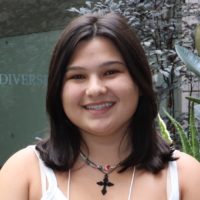
Project Summary:
The genome serves as the blueprint for an organism, thus having a comprehensive understanding of the various functional elements within an organism’s genome provides for a deeper sense of its underlying biological regulation. Current genome annotation algorithms require an open reading frame (ORF) of at least 100 amino acids in length as a criteria in distinguishing a protein-coding gene from a non-coding gene. However, a recent reannotation of Arabidopsis thaliana long non-coding RNAs (lncRNAs) identified a set of highly conserved, small ORF- (sORF, less than 100 amino acids) containing lncRNAs with evidence of ribosomal interaction, suggestive of these lncRNA’s ability to be translated into protein products. In my project, I explored the importance of a subset of these sORF-containing lncRNAs that may cause a phenotypic effect by disrupting expression in the targeted gene. We approached this problem by disrupting the Arabidopsis genes using SALK insertion lines to observe potential phenotypes. Using low throughput phenotyping assays on plates along with the SmartRoot measurement tool, we observed root development of these insertion lines over time. To track early growth and rosette development, we used high throughput phenotyping coupled with a PlantCV-based bulk image analysis pipeline. With these methods, we examined potential phenotypic effects of the disruption of these sORF-containing lncRNA genes.
My Experience:
I entered this program with very little research experience and a general lack of in confidence in any lab setting. My main attraction in becoming an intern at Boyce Thompson Institute was to gain independence and familiarity in such an environment. When I accepted this position, I did not realize how much the program would offer me. I was surrounded by a network of support from my mentor, lab, and my fellow REU students. Before this internship, I was pretty set on attending medical school and receiving my MD. However, being a BTI intern was the first time I genuinely felt like a scientist. I was proud of what I was doing and am now looking into dual MD/PhD programs as a result. I am forever thankful for what this internship taught me and how it influenced whatever path I may follow.
